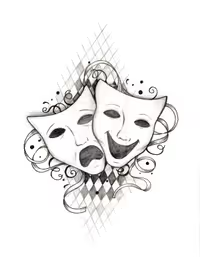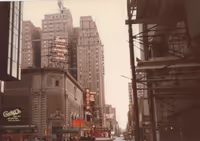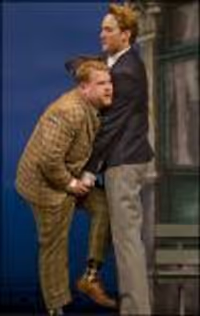Can you name the actors who started in their mid-to-late 20s?
#1Can you name the actors who started in their mid-to-late 20s?
Posted: 5/4/13 at 4:32pm
It seems like all of the famous theater actors started acting when they were teenagers or younger. I know a few people who are 24-28 years old, who discovered their sudden love for musical theater, yet they feel like it's too late for them to start acting because they have no experience and never took acting/singing lessons before.
I always hear "it's never too late", but it sure seems like the opposite of that in this case. I think Patti LuPone officially started her career when she was 23, but she studied in Julliard, so of course she already had experience at that age.
#2Can you name the actors who started in their mid-to-late 20s?
Posted: 5/4/13 at 4:59pmBut she didn't "Make it big" until she was in her 30s.
#2Can you name the actors who started in their mid-to-late 20s?
Posted: 5/4/13 at 5:05pmThat's not the point. I'm talking about starting a career in this business.
#3Can you name the actors who started in their mid-to-late 20s?
Posted: 5/4/13 at 5:24pm
LuPone received her first Tony nomination when she was 26.
The same is true of any profession. It's not impossible to make a late start, it's just more difficult. Since acting is already more difficult than most professions, one can do the math.
#4Can you name the actors who started in their mid-to-late 20s?
Posted: 5/4/13 at 5:43pm
There's a lot of folks who started out, struggled for years and years, and only broke big later on in their career (currently, Jane Lynch stands out to me among that crew. I believe she was already 40 when she booked Best in Show.)
In terms of the much rarer actually-had-another-career-and-started-late, Ken Jeong comes to mind. He practiced Internal Medicine before winning a Stand-Up contest when he was 28, and booked his first film role ten years later.
#5Can you name the actors who started in their mid-to-late 20s?
Posted: 5/4/13 at 5:45pm
But I think it depends how talented you are. One may not have the most experience, but if they shine enough in the audition process, then they could have a good chance of getting a role.
And you might want to consider that age isn't that much of a big deal; as it would be in Hollywood. You can be 35 years old, and play Marius in Les Miserables or something
Also, showbiz can be really unpredictable. Like a newcomer would end up getting the part rather than an experienced actor who's been working for 5 years.
Updated On: 5/4/13 at 05:45 PM
#6Can you name the actors who started in their mid-to-late 20s?
Posted: 5/4/13 at 5:51pm
"But I think it depends how talented you are. One may not have the most experience, but if they shine enough in the audition process, then they could have a good chance of getting a role."
Getting in the room is half the battle. If you're not Equity, and I'm assuming since you'd be just starting out you wouldn't be and you don't have an agent, you're basically limited to non-union jobs in and out of the city or going to every EPA and ECC and hoping they have time to see non-eqs. The odds of even an equity member being cast in a show off of an ECC aren't great, let alone a non-eq, though of course there are stories and it certainly has happened. So, you need to get your Equity card, which you can get in a number of ways but most of them require quite a few years of investment of time and a lot of that time is gonna be working places that ain't pretty. The requisite training to get you to the "broadway level" of even being able to say you "move well" without being a dancer is a significant investment of time, and I'm sorry but most major roles in musical theatre will require a trained voice. Not because of the sound, obviously a pop-rock sound is very fashionable these days, but because of the sheer endurance required to perform 8 times a week. It's a marathon, not a sprint, and training your voice and your body to sustain that isn't a quick thing to learn.
Of course it can be done and if that's your passion, then go for it and get to work, but it's not an easy road.
(Note: using the royal "you" here, obviously I have no idea if you specifically want to try this)
#7Can you name the actors who started in their mid-to-late 20s?
Posted: 5/4/13 at 5:54pm
Good luck getting a major role (or any role) if it's your first stage appearance at age 35. (Not impossible, just difficult.)
The casting people I know are very sensitive to whether performers have experience appropriate to their age. If you are 20 and have only appeared in college productions, that's one thing; it's quite another if you are 35.
***
As for Patti LuPone, she was nominated for a Tony at 26, but she had been working professionally for years after training at one of the most prestigious acting schools in the country. That she wasn't yet a household name (*I* certainly knew who she was and had seen her in two musicals) before she turned 30 doesn't mean much. She is NOT an example of someone who started "late" in show business.
Few people become household names on the stage before they are 30. Julie Andrews was the exception.
If somebody has the cash reserves and/or dedication, I wouldn't say it is "too late" for them to start in their mid-20s. But 30s and onward gets increasingly more problematic.
Updated On: 5/4/13 at 05:54 PM
#8Can you name the actors who started in their mid-to-late 20s?
Posted: 5/4/13 at 6:10pm
"She is NOT an example of someone who started "late" in show business."
I didn't say that she was. Because like I specifically stated, she had experience before she was 23.
I made this topic because I want to know some good examples of successful actors who started in their mid-to-late 20s and became successful on Broadway, so that maybe it could encourage and inspire people at that age to become actors for the theater.
So far, someone mentioned Jane Lynch, but she doesn't really count since she does film/tv work.
#9Can you name the actors who started in their mid-to-late 20s?
Posted: 5/4/13 at 6:29pmIf we're just limiting it to Broadway, I believe Michael Jeter is a notable example. He seems to have (like Ken Jeong after him) switched from medicine to performing around 30 or so, and won a Tony for his B'way debut in GRAND HOTEL at 38. Though I admit I don't know when he began tooling around in regional theatre before coming to New York, so he may not be exactly what you're looking for.
#10Can you name the actors who started in their mid-to-late 20s?
Posted: 5/4/13 at 7:29pm
Per Wiki, Jeter changed from medicine to acting in college. He just worked in regional theater and off-Broadway and didn't make his Broadway debut until he was 38. But he had been working all along.
He made a very brief but very funny appearance in the film HAIR, which was released when Jeter was 27. (See the "White Boys" segment and look for the inductee with the red toenails.)
***
BroadwayStar, I was arguing with Ripped Man, not you. It was he who named Lu Pone as an example of "late success". She was in fact the opposite; she just worked on serious productions without a lot of commercial appeal.
Updated On: 5/4/13 at 07:29 PM
#11Can you name the actors who started in their mid-to-late 20s?
Posted: 5/4/13 at 9:57pm
Ahh, I must have been taken in by the romance of the idea of his Tony being a later-in-life validation. Of course, later being 38 is relative, naturally...
Also, a quick google search turns up a brief article on this topic... if it's to be believed, Alan Rickman and John Mahoney are two examples. Rickman was a graphic designer into his 30s, and Mahoney a teacher, editor and Army veteran before taking to the stage at 37.
Videos






